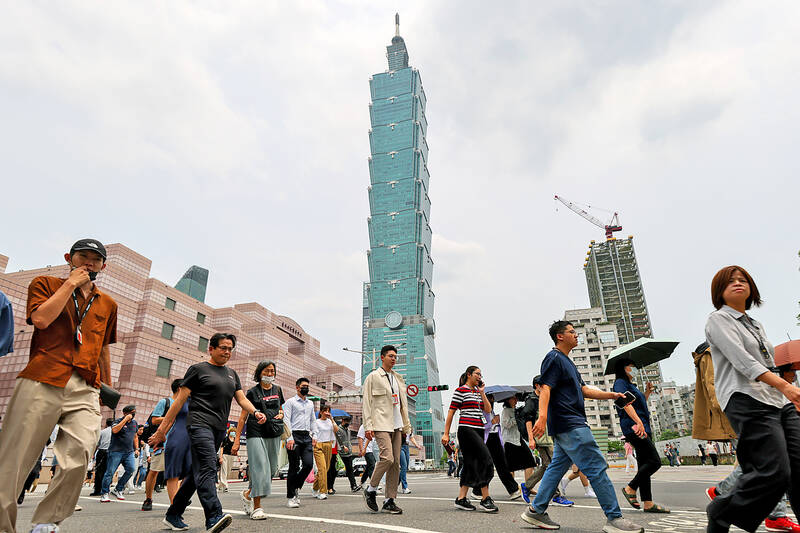Taiwan remained the fifth-largest net creditor last year as its net international investment position (NIIP) hit another new high, the central bank said on Friday.
Taiwan’s external financial assets totaled US$2.91 trillion at the end of last year, up US$247.04 billion, or 9.3 percent, from a year earlier, while the nation’s external financial liabilities reached US$1.17 trillion, up US$183.12 billion, or 18.5 percent, from a year earlier, data compiled by the central bank showed.
The difference between Taiwan’s external financial assets and liabilities hit a new high of US$1.74 trillion, up US$63.92 billion, or 3.8 percent, from a year earlier, positioning the nation as the world’s fifth-largest net creditor, the data showed.

Photo: EPA-EFE
The NIIP is the difference between a country’s external financial assets and its external financial liabilities, the central bank said.
Japan took the top net creditor spot with a NIIP of about US$3.44 trillion last year, followed by Germany (US$3.20 trillion), China (US$2.19 trillion) and Hong Kong (US$1.78 trillion), the central bank said.
The rise in Taiwan’s external financial assets last year stemmed partly from a boom in global stock markets, which pushed up sharply the value of overseas shares held by investors in Taiwan, it said.
Stock markets worldwide rose about 17 percent last year, helping Taiwan’s portfolio investments rise 14.1 percent from a year earlier to US$1.39 trillion, it said.
The nation’s cumulative outbound investments also hit a new high of US$500.14 billion last year, up 10.9 percent from a year earlier, as restructuring of global supply chains led many Taiwanese companies to send more of their funds overseas, it said.
The central bank was referring to companies such as contract chipmaker Taiwan Semiconductor Manufacturing Co (台積電), which has poured funds into the US, Japan and Germany to build advanced wafer fabs to diversify its production bases.
Taiwan has long maintained a surplus in its current account, which mainly measures the exports and imports of a country’s merchandise and services.
The other big creditors, Japan, Germany and China, have also traditionally been net exporters, though Japan has recorded trade deficits over the past few years.
At the end of last year, Taiwan’s current account hit US$105.33 billion, up from US$100.93 billion as of the end of 2022, the central bank data showed.
External financial liabilities were boosted by cumulative foreign direct investment in Taiwan, which reached a new high of US$136.6 billion last year, up 9.8 percent from a year earlier.
In addition, total portfolio investments in Taiwan by overseas investors were up 33.5 percent from a year earlier to US$710.9 billion, the central bank said.
The higher portfolio numbers reflected, in part, the 26.8 percent rise in the TAIEX last year, it said.

NEW IDENTITY: Known for its software, India has expanded into hardware, with its semiconductor industry growing from US$38bn in 2023 to US$45bn to US$50bn India on Saturday inaugurated its first semiconductor assembly and test facility, a milestone in the government’s push to reduce dependence on foreign chipmakers and stake a claim in a sector dominated by China. Indian Prime Minister Narendra Modi opened US firm Micron Technology Inc’s semiconductor assembly, test and packaging unit in his home state of Gujarat, hailing the “dawn of a new era” for India’s technology ambitions. “When young Indians look back in the future, they will see this decade as the turning point in our tech future,” Modi told the event, which was broadcast on his YouTube channel. The plant would convert

‘SEISMIC SHIFT’: The researcher forecast there would be about 1.1 billion mobile shipments this year, down from 1.26 billion the prior year and erasing years of gains The global smartphone market is expected to contract 12.9 percent this year due to the unprecedented memorychip shortage, marking “a crisis like no other,” researcher International Data Corp (IDC) said. The new forecast, a dramatic revision down from earlier estimates, gives the latest accounting of the ongoing memory crunch that is affecting every corner of the electronics industry. The demand for advanced memory to power artificial intelligence (AI) tasks has drained global supply until well into next year and jeopardizes the business model of many smartphone makers. IDC forecast about 1.1 billion mobile shipments this year, down from 1.26 billion the prior

People stand in a Pokemon store in Tokyo on Thursday. One of the world highest-grossing franchises is celebrated its 30th anniversary yesterday.

Zimbabwe’s ban on raw lithium exports is forcing Chinese miners to rethink their strategy, speeding up plans to process the metal locally instead of shipping it to China’s vast rechargeable battery industry. The country is Africa’s largest lithium producer and has one of the world’s largest reserves, according to the US Geological Survey (USGS). Zimbabwe already banned the export of lithium ore in 2022 and last year announced it would halt exports of lithium concentrates from January next year. However, on Wednesday it imposed the ban with immediate effect, leaving unclear what the lithium mining sector would do in the